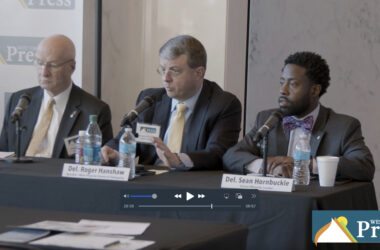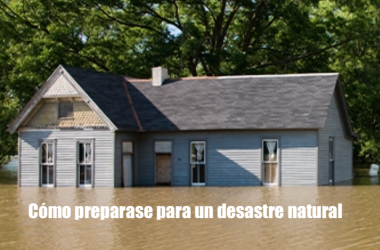
Fairmont State University director of emergency services and chief of campus police for FSU and Pierpont Community & Technical College Jack Clayton (from left), Fairmont Police Chief Steve Shine, FSU student government association member Darren Bradley and FSU Faculty Welfare Committee chair and assistant professor of criminal justice Travis Zimmerman participate in a panel discussion about guns on campus on Wednesday while Deputy Chief of Campus Police for FSU and Pierpont Matt Swain (far left) and the crowd watch.
FAIRMONT, W.Va. — A panel discussion on the issue of allowing guns on college campuses was held in Fairmont on Wednesday night.
The Fairmont State University College of Liberal Arts and the FSU Faculty Welfare Committee hosted a community panel discussion on the issue at the Ruth Ann Musick Library.
There were four speakers on the panel: Faculty Welfare Committee Chair and FSU assistant professor of criminal justice Travis Zimmerman, director of emergency management and chief of campus police for FSU and Pierpont Community & Technical College Jack Clayton, Fairmont Police Chief Steve Shine and FSU Student Government Association member Darren Bradley.
The reason that the school decided to have a panel about the issue of guns on campus was because West Virginia House Bill 2446 was introduced in January 2015, he said.
“The House proposed a bill that said basically ‘we are going to remove the prohibition for the carrying of weapons on college campuses,’” Zimmerman said.
“As of right now it is dead. When we read that students and faculty and staff alike were all, ‘What are the implication of this? What’s the possible fallout?’ We started to discuss that back and forth.”
Everyone started to realize that it was a polarizing issue and the school didn’t want people to argue about it; they wanted people to discuss it. So they decided to have a panel discussion, he said.
Panel member Clayton spoke about one of the big issues that people have with guns on campus and with people carrying concealed weapons without a permit — training.
“I think the big thing goes back to a lack of training,” Clayton said.
“Concealed carry doesn’t make somebody a public defender,” he said.
Situations in which an untrained person uses a gun usually don’t end well, Clayton said.
Clayton also mentioned that people have to keep in mind the irrevocable results that are caused by the misuse of a firearms. People have to be right when they use deadly force and too many people have a cavalier attitude about it, he said.
Shine talked about issues with people using guns, including the problems law enforcement faces with identifying people with mental health issues who aren’t allowed to have a gun.
Mental health screening is important but is limited by Health Insurance Portability and Accountability Act (HIPAA) laws. There is no watch list with the names of people who have been declared mentally incompetent and aren’t allowed to have a gun, Shine said.
If a person is declared mentally incompetent by a judge or if a doctor reports that a person is having homicidal thoughts, then a flag should be raised, he said.
“I think mental health has been one of the biggest factors in shootings,” Shine said.
Shine said if there is a situation, such as an active-shooter situation or a domestic dispute, that people should take action. That action could include calling 911, stepping in between people in an altercation, or responding in an active-shooter situation with running, fighting or hiding.
He emphasized that he was not telling people to put themselves in harm’s way, or to do anything they are uncomfortable doing, but that they should do something.
Bradley talked about a survey the student government association at FSU did on the issue. He said that contrary to the popular belief that college students don’t want guns on campus, at FSU the poll showed about equal numbers for and against guns on campus.
Those against guns on campus believed they would feel less safe with guns on campus, that guns would be a distraction in class and they didn’t understand the need for guns when the school has campus police, he said.
“I believe the students at Fairmont State University would like to see it go forward,” Bradley said about guns being allowed on campus.
Zimmerman presented statistics on gun violence and served as the emcee for the panel discussion.
Justin Sime is a freshman student at FSU, and he attended the panel discussion because he is interested in guns and the Second Amendment. He is in favor of having guns on campus, he said.
“I know if there’s somebody that’s licensed around me with a gun I feel a lot safer than if nobody had a gun around me,” Sime said.
Zimmerman expects that a bill allowing guns on college campuses will appear in the West Virginia Legislature again, he said.
“Maybe now when we see it we’ll look at it and say, ‘Well, remember when we had that panel? This is what’s really going to happen. This is what we’re doing,’” Zimmerman said.
Email Michelle Dillon at [email protected].





